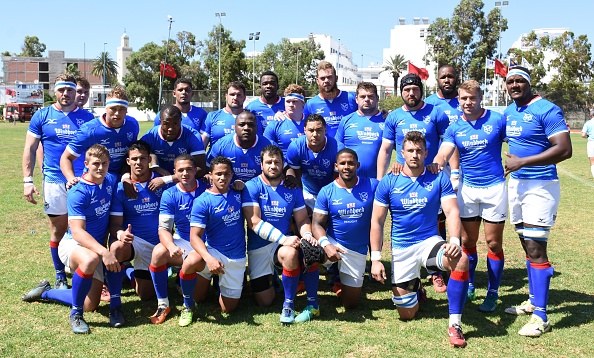The Welwitschias are committed to world cup glory, and to elevate other structures within Namibian rugby.
Namibia’s 20-year hunt for a victory at the Rugby World Cup will continue in Japan later this year, where Africa’s second best rugby nation face a daunting pool that includes ‘big brother’ South Africa and defending champions New Zealand.
Namibia have shown a marked improvement in recent tournaments and swept to qualification for the 2019 World Cup in emphatic style by lifting the Rugby Africa Gold Cup, a competition that does not include the Springboks.
Under Welsh coach Phil Davies, who will be leading the team for the second time at the global showpiece tournament, Namibian rugby has improved in leaps and bounds, even while the country’s union struggles with funds to keep the game afloat.
READ MORE | Super Rugby In Sin Bin
Loading...
The Welwitschias, as the side are known, have lost all 19 previous games at the World Cup since their first qualification in 1999, but in the last tournament in England scored their most points (70) and conceded their fewest (174) in a pool that also included eventual winners New Zealand.
“We are positive we can continue to make improvements at the World Cup and get that first win,” Corrie Mensah, president of the Namibia Rugby Union, told FORBES AFRICA in an exclusive interview from Windhoek.
“Together with the head coach [Davies], we have mapped out a plan for the build-up to the tournament and already have most of our players together in camp.
“We have a tough program, the guys know they have to work hard to be part of our World Cup plans, but the preparation is there, the structures are in place and we are looking forward to a big year for Namibian rugby.”
The side open their World Cup campaign against Italy, in Higashiōsaka on September 22, before a clash with the Springboks in Toyota, six days later and another encounter against the All Blacks in Tokyo on October 6.
READ MORE | Bryan Habana Swaps Sweatpants For Suits
But the game the team will, realistically, be targeting for their first victory is the match-up with fellow minnows Canada, in their final pool match in Kamaishi a week later.
“Our main objective is to get that first World Cup win,” Mensah says. “That would be a big moment for Namibian rugby and another sign that we are on an upward curve. I think then we could call our tournament a success.
“The second objective is to try and be competitive against the All Blacks, Springboks and Italy. If we can do that, with a fraction of the resources of those sides, then we can say we are punching above our weight.”
Namibia will compete in the 2019 World Rugby Nations Cup in Uruguay in June along with the hosts, Romania and Russia, which will give them three matches against fellow second-tier nations.
They then defend their title in the African Gold Cup, before playing a couple of World Cup warm-up games that have yet to be confirmed.
The team will also play in South Africa’s domestic SuperSport Rugby Challenge, a tournament that has proven vital in giving their players quality, competitive matches that they would, simply, not get at home.
But while the team continues to show improvement on the pitch, Mensah admits that it has been a hard slog off it to keep Namibian rugby’s development goals in place.
“The biggest challenge we face is a financial one and the allocation of grants from World Rugby should be used in the right areas,” Mensah says.
“High performance grants should go to high performance protocols, development funds likewise. Making sure we do that is a major commitment we have made.”
Corrie Mensah
Mensah has also committed to improving other structures within Namibian rugby, away from the senior men’s team.
“We have had major difficulties, with the economic slump in the country, in terms of attracting sponsorship, which has had a major impact on our league structures.
“Women’s rugby is non-existent in Namibia, but it is part of our strategic plan to get it off the ground.
The place to start is with regional teams, which we are seeking to do this year, and then, hopefully, in future that filters down to club sides.”
Mensah is also hoping to improve Namibia’s Sevens structures, with that version of the game growing in popularity around the world.
“With Sevens … it is about creating a whole new culture around it because it is not something that is traditional to Namibian rugby.
“It is part of our three and five-year strategic plans, but again the funding for that kind of development is a challenge. We need to get players into an academy structure and work with them constantly, but that all costs a lot of money.”
In many ways, Namibia, with a population of 2.6-million is already punching above their weight just to be at the World Cup, especially with their fiscal challenges.
But how far they can go in terms of developing rugby in the country is an exciting prospect, and a good showing in Japan will confirm that they are a nation on the rise.
-Nick Said
Loading...
